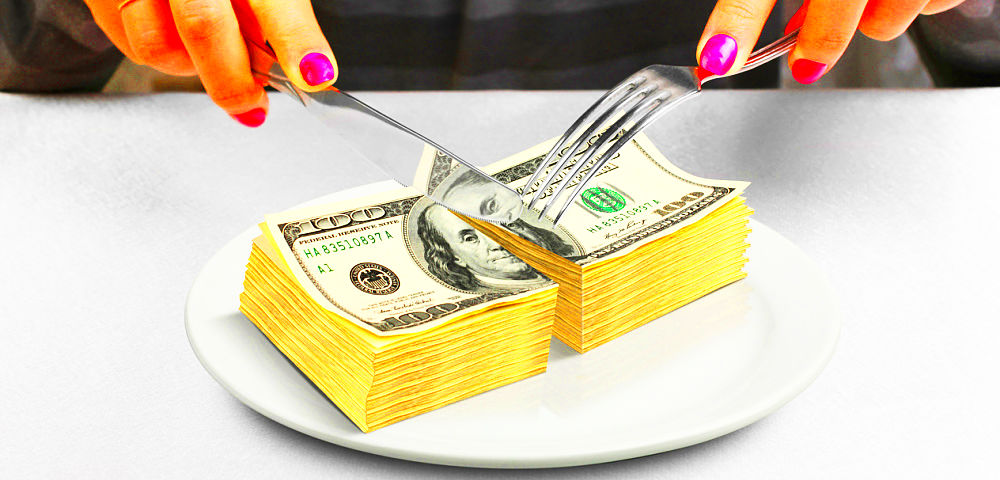Many investors hear that a stock is splitting and want to jump in thinking that by owning a stock right before it splits means they will be getting more than they paid for. But the truth is you never come out ahead after a stock split. Yet, many investors still hold on to this false assumption.
In this post, we will look at what a stock split is and why you don’t come out ahead. We will also look at one instance where you can profit nicely from a stock split, but the opportunity doesn’t present itself often.
Let’s get started understanding what exactly a stock split is.
What Is a Stock Split?
A stock split is when a company decides to increase the number the shares outstanding and lower the stock price. For example, if a stock is trading at $100 per share and the company announces a 2 for 1 stock split, you will get two shares of stock for every one that you own.
So if you own 100 shares, after the split you will own 200 shares of stock. There are a couple reasons why a company will do this. For example, if the stock price has gotten a lot higher than its competitors, a company might issue a split to make the stock price more in line with its peers.
Another reason would be to make a stock look more affordable to small investors. For example, let’s say you want to buy some shares of ABC Company but the stock price is $300 per share. Then one day the company announces a 5 for 1 stock split. The result is a new stock price of $60 per share. You would see the $60 share price and more easily afford buying some shares.
Of course, companies also do reverse stock splits. This is done to decrease the number of shares outstanding and increase the stock price. This is usually done for one of three reasons:
- The price of the stock has dropped below $1 and the company is risking getting its stock delisted from the exchange.
- The company is looking to deter hostile takeovers of the company
- The company is looking to stop speculators from hurting the stock price
In either case, the reverse stock split works the same way, only in reverse. So instead of a 2 for 1 stock split, it would be a 1 for 2 stock split. If you owned 100 shares before the split, after you would own 50 shares.
Why You Think You Profit
Many times, investors who are unfamiliar with stock splits think they are coming out ahead when a stock splits. In some cases, they might see a stock announced it is splitting and buy shares before the split. The flaw in this thinking is that you are doubling your shares and your position in a 2 for 1 stock split.
While you are getting more shares, your overall investment is remaining the same since the share price is being cut in half as well.
For example, if you own 100 shares of ABC Company trading at $100 per share and they announce a 2 for 1 stock split, you will end up owning 200 shares after the split. But the new share price isn’t $100, it is $50.
Before the split, you owned 100 shares at $100 each, for a total investment of $10,000. After the split, you own 200 shares at $50 each, for a total investment of $10,000. So while you think you are making out by owning more shares, you are still in the same financial situation as before the stock split.
How To Profit From A Stock Split
There is no guaranteed way to profit from a stock that splits. But there are some instances where you can earn a quick short term gain after a stock splits. This usually happens when a stock that is in high demand splits.
A perfect example of this is Apple (AAPL). Before Apple announced a 7 for 1 stock split in 2014, the stock was trading at over $600 a share. Many small investors wanted to own Apple, but didn’t have the cash to buy a decent number of shares.
Right after the stock split, it was trading are roughly $92 per share. The next day the price jumped $3 per share as small investors, now seeing a much lower and more affordable stock price, bought in. If you had a decent number of shares, you could have profited nicely right after the split.
But like I said, this only happens once in a while with stocks that everyone wants to own. The majority of the time, you wouldn’t see this happen.
Final Thoughts
At the end of the day, stock splits should not be a factor in owning a stock. As an investor, you should be buying a stock based on the belief that the stock price will increase over time as the company executes on its goals.
If you are buying stocks in hopes of profiting from splits, you are rarely going to make money. As I showed you, most times you will be in the same situation as before the split. Of course, there are rare occasions where you could come out ahead, but they are rare.
So as an investor, focus more on the quality of stocks you are buying and don’t get caught up with other events that can skew your plans for how to invest your money.




